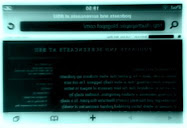I've just finished reading
Gilly Salmon and Palitha Edirisingha, eds. (2008), Podcasting for Learning in Universities. It covers some introductory techniques, but is primarily a collection of research reports from a number of institutions. I won't give a detailed review, but here are a few themes that emerge from it:
Again, podcasting doesn't seem to lead to m-learningAcross
all the studies collected in the book, only between 7% and 16% of participants downloaded podcasts onto MP3 players. This matches my reading of other published studies in which I have only found one which didn't note the lack of desire to put the podcasts onto portable devices.
There is an interesting essay by David Bell ('The University in your Pocket') in which he critiques the notion that mobile learning is necessarily a positive development. He suggests that the desire to fill student's 'empty time' with educational material both runs against their own desire to separate work and leisure, but also reinforces a problematic ideological pressure to demand constant productivity. In other words, it reinforces the notion that moments of silence or emptyness are simply wasted time. It's an interesting take, I think.
Another point which emerged from the studies (and which cropped up in my focus groups) was that students have sense of different media being more or less appropriate to learning. From this angle, they accessed podcasts on computer because the computer was a medium which they associated with learning, unlike the iPod - which they associated with entertainment. One study found students 'preferred to give podcasts their undivided attention'. Another chapter discusses this in the light of educational research (e.g.
Salomon, 1984), which suggest that student motivation is often driven by their expectations about their chances of learning effectively via any given medium.
Podcasts are popularAll the reports found that students liked the use of podcasts. Unsurpisingly, they were wary of podcasts replacing face-to-face teaching; however, many were clear about the specific pedagogical benefits of podcasting as opposed to conventional methods. Again, this is something I found in my focus groups.
The term 'podcast' is woollyI think some people are still sticklers for the idea that a podcast isn't a podcast if it's not delivered via a feed. Salmon and Edirisingha reject this, and are happy to use the term to define any audio (or audiovisual) file which is available via an online platform as a podcast. I tend to agree with them. However, I did find my jaw heading floorwards when I read one study in which two 'podcasts' were broadcast 'via speakers during face-to-face sessions called workshops' [sic]. Whether the tutors attended these sessions (silently), we don't know. In fairness, the authors did admit they had 'perhaps distorted the concept of podcasts by not offering them for download'....
Lots of people use them in lots of different waysExamples in the book include recorded lectures, preparatory material, videos of lab sessions, iWalks (for fieldtrips), assessment feedback, software training etc. Some seemed to work better than others, but Salmon and Edirisingha were probably right in stating the basic principle that one should 'make the decision to use podcasts ... based on a teaching and learning problem, challenge or issue that you have identified.'
Overall, it's an interesting collection of studies - some illuminating, some pretty weird. I'd say, however, that it is probably of more use to people interested in the pedagogical debates than those just trying to start out.
